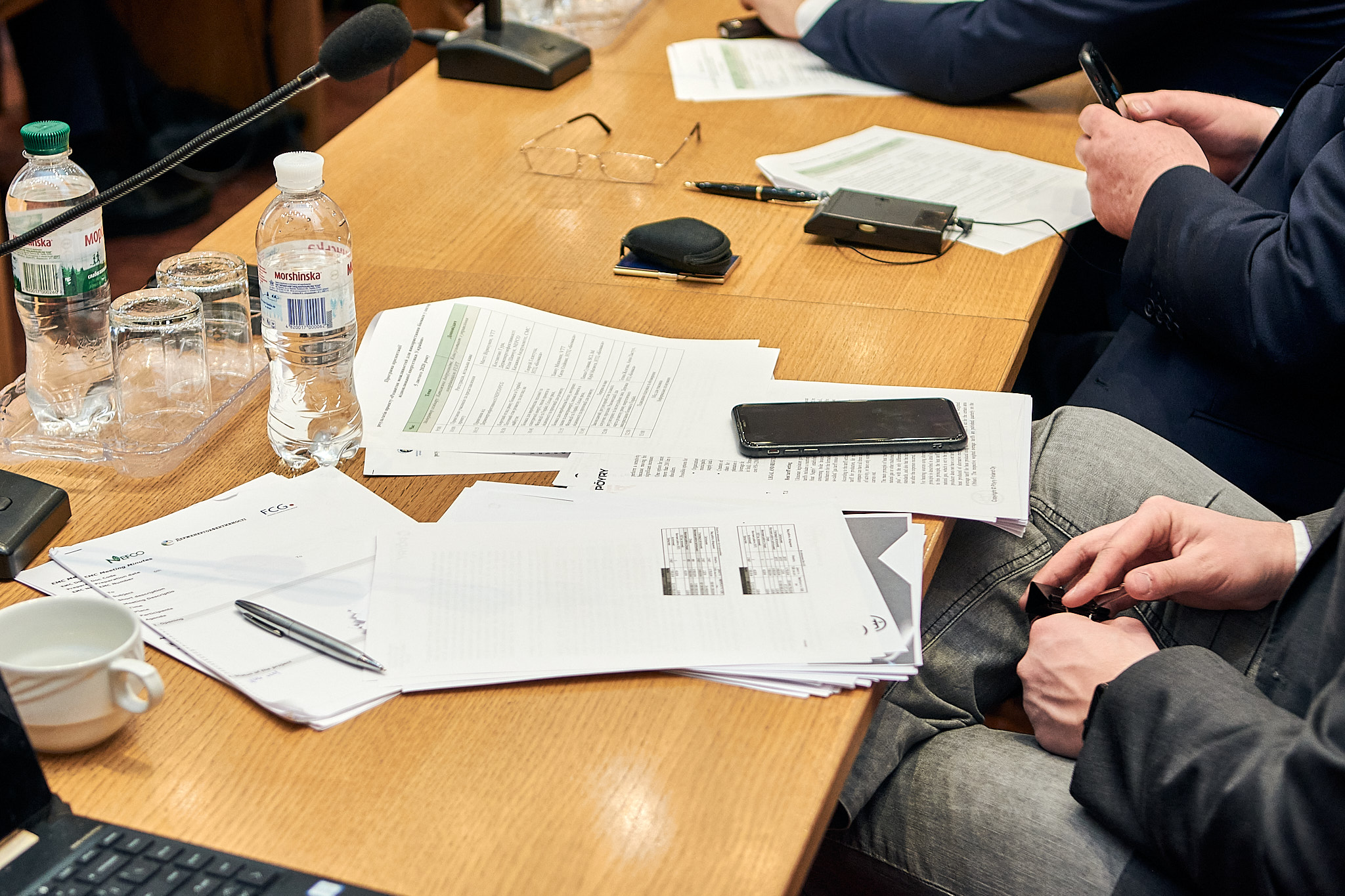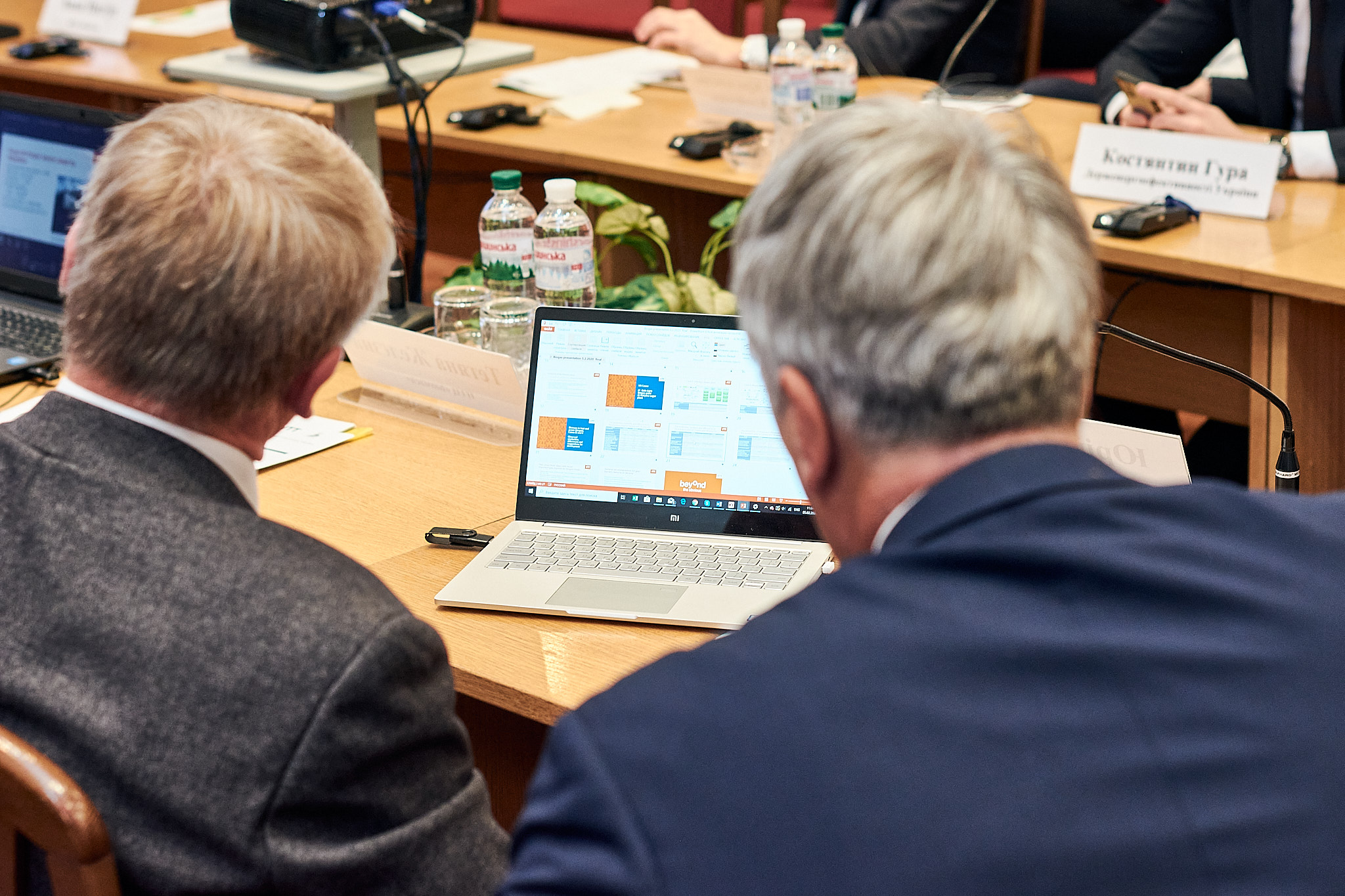On May 25, the first online meeting of the Working Group on Bioenergy Knowledge was held within the framework of the project “Ukraine Sustainable Bioenergy Value Chain Innovation – Knowledge Management Programme” with the support of the EBRD and GEF, which was attended by 25 participants.

The Head of the Working Group, Georgii Geletuha, Director of the Scientific Engineering Centre “Biomass” Ltd., opened the meeting and noted that the project started on April 1, 2023 and will continue for 18 months.
You can find out more about the project to read the article about the project opening webinar, as a result of which the Working Group of the project was formed, which officially included 28 participants.
At the beginning, Georgii Geletukha presented the first two reports of the project: “The General Plan and Project’s implementation schedule” and “The Project’s stakeholders overview”. He spoke about the structure of the Project tasks and also showed a list of future reports and project results with deadlines for their implementation.
Key experts, in particular: international (Algirdas Jasinskas, professor, Grand PhD, Vytautas Magnus University; Michael Kettner, MD, International Biogas and Bioenergy Competence Center) and local (on education: Hennadii Holub, professor, Grand PhD, National University of Life and Environmental Sciences of Ukraine; Savelii Kukharets, professor, Grand PhD, Polissia National University and on bioenergy: Tetiana Zheliezna, PhD, head of the SEC Biomass department) have joined to the Project’s team.
Georgii Geletukha added that at the beginning of the project, invitations were sent to higher educational institutions of Ukraine, as well as companies and organizations in the bioenergy sector. Currently, 59 stakeholders have already entered the list of the project steakholders, including 29 representatives of the Ministry of Education and Science of Ukraine and 30 companies/organizations of the bioenergy sector and those close to it.
The Working Group on bioenergy knowledge also includes 18 stakeholders, in addition to the project experts, who will directly participate in the discussion of the project reports. The rest of the stakeholders will receive the final versions of the reports for review.
The presentation “The current state of the higher education system overview in the field of bioenergy and the best international experience among relevant educational institutions that can be implemented in Ukraine” was presented by the local senior expert of the project Hennadii Holub and the project’s local expert Savelii Kukharets.
Savelii Kukharets presented a list of knowledge fields and specialties for implementation of educational programmes or educational components on bioenergy. In particular, he focused on the specialty 145 Renewable energy sources and hydropower, the standard of which is currently under development. It could be a core specialty for bioenergy educational programmes.

A total of 522 higher educational institutions are registered in Ukraine, among which 23% (118 higher educational institutions) are natural and technical. After analyzing websites of the educational programmes available on these HEIs websites, it was determined that only 29 HEIs (6%) have a renewable energy component. The renewable energy and bioenergy components contain various topics of lectures on general education, biological, technological, technological-technical and technical aspects. The topics of lectures in the technical-technological and technical direction are included in the educational programs of the engineering profile, and the topics of the lectures in the general educational, biological and technological direction prevail in the educational programs of the biological profile.
Savelii Kukharets also presented an analysis of selected components of bioenergy-related educational and scientific programmess of foreign universities. He gave the example of Pennsylvania State University, which has a separate unit specifically dealing with renewable energy and bioenergy and researches not only the energy conversion of biomass, but also the production of biopolymers, biocomposites, as well as covering sustainable business strategies and environment issues based on bioenergy systems.

Important fact that the number of educational programmes related to RES and bioenergy in higher educational institutions of Ukraine has decreased in recent years. The reason was the lack of an appropriate educational standard for renewable energy. Also the requirement for educational programmes to clearly meet the criteria of the educational standard for accreditation. The second reason is the small number of academics who meet the requirements of the Ministry of Education and Science of Ukraine, in particular, the availability of relevant publications, international experience, internships, etc.
There are also examples of syllabi with a comprehensive presentation of bioenergy topics, but they are based on outdated data from the mid-90s and early 2000s. Although the bioenergy industry has developed and has new achievements since then. So, it can be stated that currently there is an insufficient number of educational bioenergy programmes and their structure is fragmented.
By the way, the available student potential is about 100 thousand students.
Next, the local expert Tetiana Zheliezna presented an overview of the directions necessary for improving the job qualifications in the bioenergy sector. The expert also provided an analysis of the best international practice that can be implemented in Ukraine, which was prepared by the international expert Michael Kettner.
Tetiana Zheliezna presented a brief overview of the current state and prospects for the bioenergy development. She said that the existing energy potential of biomass in Ukraine of about 26 million t.e./year. And there are promising directions for its use until 2050. Mrs. Zeliezna noted that the bioenergy sector is developing quite dynamically with an average growth of about 11% per year, which determines the need for creation of highly qualified jobs, in particular in the areas of biogas and biomethane production, heat and electricity production, as well as biomass procurement and supply.
Within the framework of the analysis of the best international practice for improving the qualifications of workers in the field of bioenergy, Tetiana Zheliezna noted that in all the countries under consideration there are institutions that provide special industry training.
In a number of countries (Germany, Austria, Switzerland), training courses are mandatory for biogas plants operators. Usually, faciity manufacturers provide basic training for operators and personnel during the biogas plant commissioning. The duration of the course is usually 2-4 days. After the courses, it is often necessary to pass an exam to obtain a certificate and, in some countries, to further obtain a license and work permit at biogas facility.

Mrs. Zeliezna spoke in detail about the training course of the Austrian Water Management Association (ÖWAV), which is mandatory for biogas plant operators in Austria with passing an exam at the end of the course. This course lasts 3 days, consists of educational blocks, covering general and specialized topics on biogas production, including legal aspects, hygiene requirements, etc. All components of facility, as well as labor protection issues, are considered.
For the course, which will be prepared by the international expert on education issues Michael Kettner within the framework of this project, it is proposed to involve the experience of the ÖWAV.
Moreover Tetiana Zheliezna presented a preliminary list of directions for which advanced training courses should be created in Ukraine within the project. Three directions are defined:
- Biogas plants, production of biomethane;
- Boiler houses, thermal power plants, thermal power plants on biomass;
- Biomass harvesting and supply chains.
The expert presented the lecture topics offered for each of the three courses, which will include lectures for operators and technical staff as well as managers and administrative staff of bioenergy facilities. In addition, it is planned to hold separate lectures for managers on the topic “Management of a bioenergy facility/installation/company”.
During the event participants discussed reports, which had been presented, and expressed their suggestions and comments.
During the discussion, Georgii Geletukha noted that the great interest on biogas/biomethane issue is due to current energy market situation, when such projects are the most economically attractive.
In addition, the topic of liquid biofuels and biodiesel production will be considered within the general bioenergy questions. Five lectures for teachers and tours on bioenergy facilities are also planned, which are likely to take place after the end of martial law.
Oleksandr Dombrovkyi, Chairman of the Board of the Global 100RE Ukraine organization, president of MHP Ecoenergy proposed that this project to deepen knowledge on bioenergy in higher educational institutions would be the first step of the future cooperation between universities and business in the bioenergy sector, in particular within the scientific and innovative projects of the European programme Horizon.
Alina Bilan, coordinator of the project from the EBRD, agreed with Mr. Dombrovskyi’s proposal and offered to develop proposals regarding possible ways to improve the qualifications of teachers of higher educational institutions and improve laboratory capabilities due to cooperation with business.
“All companies that build or already operate biogas plants or bio-CHP/bio-TPP are interested in providing their capacities for internships, educational students practice and professional teachers development of the relevant departments of higher educational institutions,” Oleksandr Dombrovskyi is convinced.
He emphasized that biogas and biomethane are modern competitive technologies that are necessary for the energy security of the country. Therefore, in-depth scientific research is needed in these sectors, combining various related disciplines (chemistry, organic chemistry, biotechnology, physics, soil science, etc.) to obtain new algorithms, tools and new technologies, in particular in the direction of restoration of Ukrainian soils, which are annually degraded due to erosion.
By the way, Hennadii Holub emphasized the importance of developing a special student book. Before the publication of the book, a study guide must be prepared, which must pass at least several semesters of approval and then the it can be published.
Finally, Alina Bilan thanked the steakholders for the productive discussion within the Working Group. The expert noted that the discussed issues will be useful for rethinking the previous conclusions, as well as planning the next steps in the implementation of the Programme.
Photo: archive of the Bioenergy Association of Ukraine.